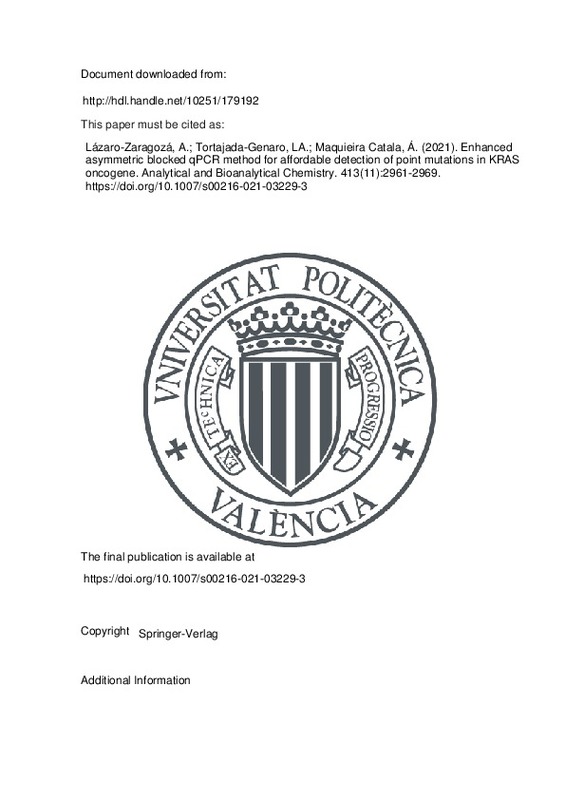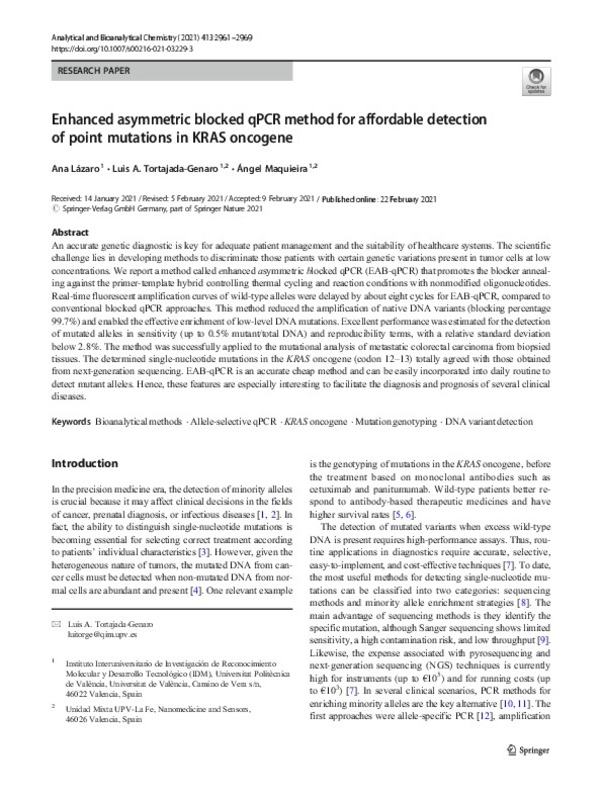JavaScript is disabled for your browser. Some features of this site may not work without it.
Buscar en RiuNet
Listar
Mi cuenta
Estadísticas
Ayuda RiuNet
Admin. UPV
Enhanced asymmetric blocked qPCR method for affordable detection of point mutations in KRAS oncogene
Mostrar el registro sencillo del ítem
Ficheros en el ítem
| dc.contributor.author | Lázaro-Zaragozá, Ana
|
es_ES |
| dc.contributor.author | Tortajada-Genaro, Luis Antonio
|
es_ES |
| dc.contributor.author | Maquieira Catala, Ángel
|
es_ES |
| dc.date.accessioned | 2021-12-30T19:27:08Z | |
| dc.date.available | 2021-12-30T19:27:08Z | |
| dc.date.issued | 2021-05 | es_ES |
| dc.identifier.issn | 1618-2642 | es_ES |
| dc.identifier.uri | http://hdl.handle.net/10251/179192 | |
| dc.description.abstract | [EN] An accurate genetic diagnostic is key for adequate patient management and the suitability of healthcare systems. The scientific challenge lies in developing methods to discriminate those patients with certain genetic variations present in tumor cells at low concentrations. We report a method called enhanced asymmetric blocked qPCR (EAB-qPCR) that promotes the blocker annealing against the primer-template hybrid controlling thermal cycling and reaction conditions with nonmodified oligonucleotides. Real-time fluorescent amplification curves of wild-type alleles were delayed by about eight cycles for EAB-qPCR, compared to conventional blocked qPCR approaches. This method reduced the amplification of native DNA variants (blocking percentage 99.7%) and enabled the effective enrichment of low-level DNA mutations. Excellent performance was estimated for the detection of mutated alleles in sensitivity (up to 0.5% mutant/total DNA) and reproducibility terms, with a relative standard deviation below 2.8%. The method was successfully applied to the mutational analysis of metastatic colorectal carcinoma from biopsied tissues. The determined single-nucleotide mutations in the KRAS oncogene (codon 12¿13) totally agreed with those obtained from next-generation sequencing. EAB-qPCR is an accurate cheap method and can be easily incorporated into daily routine to detect mutant alleles. Hence, these features are especially interesting to facilitate the diagnosis and prognosis of several clinical diseases. | es_ES |
| dc.description.sponsorship | The authors acknowledge the financial support received from the Generalitat Valenciana (GVA-FPI-2017 PhD grant), the Spanish Ministry of Economy and Competitiveness (MINECO project CTQ2016-75749-R), and European Regional Development Fund (ERDF) | es_ES |
| dc.language | Inglés | es_ES |
| dc.publisher | Springer-Verlag | es_ES |
| dc.relation.ispartof | Analytical and Bioanalytical Chemistry | es_ES |
| dc.rights | Reserva de todos los derechos | es_ES |
| dc.subject | Bioanalytical methods | es_ES |
| dc.subject | Allele-selective qPCR | es_ES |
| dc.subject | KRAS oncogene | es_ES |
| dc.subject | Mutation genotyping | es_ES |
| dc.subject | DNA variant detection | es_ES |
| dc.subject.classification | QUIMICA ANALITICA | es_ES |
| dc.title | Enhanced asymmetric blocked qPCR method for affordable detection of point mutations in KRAS oncogene | es_ES |
| dc.type | Artículo | es_ES |
| dc.identifier.doi | 10.1007/s00216-021-03229-3 | es_ES |
| dc.relation.projectID | info:eu-repo/grantAgreement/GVA//GVA-FPI-2017/ | es_ES |
| dc.relation.projectID | info:eu-repo/grantAgreement/AEI//CTQ2016-75749-R//BIOSENSORES HOLOGRAFICOS. PRUEBA DE CONCEPTO Y DEMOSTRACION EN APLICACIONES CLINICAS/ | es_ES |
| dc.rights.accessRights | Abierto | es_ES |
| dc.contributor.affiliation | Universitat Politècnica de València. Departamento de Química - Departament de Química | es_ES |
| dc.description.bibliographicCitation | Lázaro-Zaragozá, A.; Tortajada-Genaro, LA.; Maquieira Catala, Á. (2021). Enhanced asymmetric blocked qPCR method for affordable detection of point mutations in KRAS oncogene. Analytical and Bioanalytical Chemistry. 413(11):2961-2969. https://doi.org/10.1007/s00216-021-03229-3 | es_ES |
| dc.description.accrualMethod | S | es_ES |
| dc.relation.publisherversion | https://doi.org/10.1007/s00216-021-03229-3 | es_ES |
| dc.description.upvformatpinicio | 2961 | es_ES |
| dc.description.upvformatpfin | 2969 | es_ES |
| dc.type.version | info:eu-repo/semantics/publishedVersion | es_ES |
| dc.description.volume | 413 | es_ES |
| dc.description.issue | 11 | es_ES |
| dc.identifier.pmid | 33619642 | es_ES |
| dc.relation.pasarela | S\429717 | es_ES |
| dc.contributor.funder | Generalitat Valenciana | es_ES |
| dc.contributor.funder | AGENCIA ESTATAL DE INVESTIGACION | es_ES |
| dc.contributor.funder | European Regional Development Fund | es_ES |
| dc.description.references | Chandler NJ, Ahlfors H, Drury S, Mellis R, Hill M, McKay FJ, et al. Noninvasive prenatal diagnosis for cystic fibrosis: implementation, uptake, outcome, and implications. Clin Chem. 2020;66:207–16. | es_ES |
| dc.description.references | Schmidt RLJ, Simon A, Popow-Kraupp T, Laggner A, Haslacher H, Fritzer-Szekeres M, et al. A novel PCR-based point-of-care method facilitates rapid, efficient, and sensitive diagnosis of influenza virus infection. Clin Microbiol Infect. 2019;25:1032–7. | es_ES |
| dc.description.references | Reck M, Rabe KF. Precision diagnosis and treatment for advanced non–small-cell lung cancer. N Engl J Med. 2017;377:849–61. | es_ES |
| dc.description.references | Vargas DY, Kramer FR, Tyagi S, Marras SAE. Multiplex real-time PCR assays that measure the abundance of extremely rare mutations associated with cancer. PLoS One. 2016;11:e0156546. | es_ES |
| dc.description.references | Allegra CJ, Rumble RB, Hamilton SR, Mangu PB, Roach N, Hantel A, et al. Extended RAS gene mutation testing in metastatic colorectal carcinoma to predict response to anti-epidermal growth factor receptor monoclonal antibody therapy: American Society of Clinical Oncology provisional clinical opinion. J Clin Oncol. 2016;34:179–85. | es_ES |
| dc.description.references | Das V, Kalita J, Pal M. Predictive and prognostic biomarkers in colorectal cancer: a systematic review of recent advances and challenges. Biomed Pharmacother. 2017;87:8–19. | es_ES |
| dc.description.references | Khodakov D, Wang C, Zhang DY. Diagnostics based on nucleic acid sequence variant profiling: PCR, hybridization, and NGS approaches. Adv Drug Deliv Rev. 2016;105:3–19. | es_ES |
| dc.description.references | Kim S, Misra A. SNP genotyping: technologies and biomedical applications. Annu Rev Biomed Eng. 2007;9:289–320. | es_ES |
| dc.description.references | Tsiatis AC, Norris-Kirby A, Rich RG, Hafez MJ, Gocke CD, Eshleman JR, et al. Comparison of Sanger sequencing, pyrosequencing, and melting curve analysis for the detection of KRAS mutations: diagnostic and clinical implications. J Mol Diagnostics. 2010;12:425–32. | es_ES |
| dc.description.references | Milbury CA, Li J, Makrigiorgos GM. PCR-based methods for the enrichment of minority alleles and mutations. Clin Chem. 2009;55:632–40. | es_ES |
| dc.description.references | Lin CC, Huang WL, Wei F, Su WC, Wong DT. Emerging platforms using liquid biopsy to detect EGFR mutations in lung cancer. Expert Rev Mol Diagn. 2015;15:1427–40. | es_ES |
| dc.description.references | Strohmeier O, Laßmann S, Riedel B, Mark D, Roth G, Werner M, et al. Multiplex genotyping of KRAS point mutations in tumor cell DNA by allele-specific real-time PCR on a centrifugal microfluidic disk segment. Microchim Acta. 2014;181:1681–8. | es_ES |
| dc.description.references | Markou A, Tzanikou E, Ladas I, Makrigiorgos GM, Lianidou E. Nuclease-assisted minor allele enrichment using overlapping probes-assisted amplification-refractory mutation system: an approach for the improvement of amplification-refractory mutation system-polymerase chain reaction specificity in liquid biopsies. Anal Chem. 2019;91:13105–11. | es_ES |
| dc.description.references | Zhang H, Song J, Ren H, Xu Z, Wang X. Detection of low-abundance KRAS mutations in colorectal cancer using microfluidic capillary electrophoresis-based restriction fragment length polymorphism method with optimized assay conditions. PLoS One. 2013;8:54510. | es_ES |
| dc.description.references | Hindson CM, Chevillet JR, Briggs HA, Gallichotte EN, Ruf IK, Hindson BJ, et al. Absolute quantification by droplet digital PCR versus analog real-time PCR. Nat Methods. 2013;10:1003–5. | es_ES |
| dc.description.references | Li J, Wang L, Mamon H, Kulke MH, Berbeco R, Makrigiorgos GM. Replacing PCR with COLD-PCR enriches variant DNA sequences and redefines the sensitivity of genetic testing. Nat Med. 2008;14:579–84. | es_ES |
| dc.description.references | Castellanos-Rizaldos E, Milbury CA, Guha M, Makrigiorgos GM. COLD-PCR enriches low-level variant DNA sequences and increases the sensitivity of genetic testing. Molecular Diagnostics for Melanoma: Methods and Protocols, Methods in Molecular Biology. 2014. p. 623–39. | es_ES |
| dc.description.references | Briones C, Moreno M. Applications of peptide nucleic acids (PNAs) and locked nucleic acids (LNAs) in biosensor development. Anal Bioanal Chem. 2012;402:3071–89. | es_ES |
| dc.description.references | Huang JF, Zeng DZ, Duan GJ, Shi Y, Deng GH, Xia H, et al. Single-tubed wild-type blocking quantitative PCR detection assay for the sensitive detection of codon 12 and 13 KRAS mutations. PLoS One. 2015;10:1–23. | es_ES |
| dc.description.references | Kim HR, Lee SY, Hyun DS, Lee MK, Lee HK, Choi CM, et al. Detection of EGFR mutations in circulating free DNA by PNA-mediated PCR clamping. J Exp Clin Cancer Res. 2013;32:50. | es_ES |
| dc.description.references | Zhang S, Chen Z, Huang C, Ding C, Li C, Chen J, et al. Ultrasensitive and quantitative detection of: EGFR mutations in plasma samples from patients with non-small-cell lung cancer using a dual PNA clamping-mediated LNA-PNA PCR clamp. Analyst. 2019;144:1718–24. | es_ES |
| dc.description.references | Tolnai Z, Harkai Á, Szeitner Z, Scholz ÉN, Percze K, Gyurkovics A, et al. A simple modification increases specificity and efficiency of asymmetric PCR. Anal Chim Acta. 2019;1047:225–30. | es_ES |
| dc.description.references | Jia Y, Sanchez JA, Wangh LJ. Kinetic hairpin oligonucleotide blockers for selective amplification of rare mutations. Sci Rep. 2014;4:1–8. | es_ES |
| dc.description.references | Vashist SK, Luppa PB, Yeo LY, Ozcan A, Luong JHT. Emerging technologies for next-generation point-of-care testing. Trends Biotechnol. 2015;33:692–705. | es_ES |
| dc.description.references | Peterson AW. The effect of surface probe density on DNA hybridization. Nucleic Acids Res. 2001;29:5163–8. | es_ES |
| dc.description.references | Falcomatà C, Schneider G, Saur D. Personalizing KRAS-mutant allele–specific therapies. Cancer Discov. 2020;10:23–5. | es_ES |
| dc.description.references | McEvoy AC, Wood BA, Ardakani NM, Pereira MR, Pearce R, Cowell L, et al. Droplet digital PCR for mutation detection in formalin-fixed, paraffin-embedded melanoma tissues: a comparison with sanger sequencing and pyrosequencing. J Mol Diagnostics. 2018;20:240–52. | es_ES |
| dc.description.references | Milbury CA, Li J, Makrigiorgos GM. Ice-COLD-PCR enables rapid amplification and robust enrichment for low-abundance unknown DNA mutations. Nucleic Acids Res. 2011;39:e2. | es_ES |
| dc.description.references | Xiang Z, Wan R, Zou B, Qi X, Huang Q, Kumar S, et al. Highly sensitive and specific real-time PCR by employing serial invasive reaction as a sequence identifier for quantifying EGFR mutation abundance in cfDNA. Anal Bioanal Chem. 2018;410:6751–9. | es_ES |
| dc.description.references | Huang T, Zhuge J, Zhang WW. Sensitive detection of BRAF V600E mutation by amplification refractory mutation system (ARMS)-PCR. Biomark Res. 2013;1:1–6. | es_ES |
| dc.description.references | Matsuda K. PCR-based detection methods for single-nucleotide polymorphism or mutation: real-time PCR and its substantial contribution toward technological refinement. Adv Clin Chem. 2017;80:45–72. | es_ES |
| dc.description.references | Lázaro A, Yamanaka ES, Maquieira Á, Tortajada-Genaro LA. Allele-specific ligation and recombinase polymerase amplification for the detection of single nucleotide polymorphisms. Sensors Actuators B Chem. 2019;298:126877. | es_ES |









